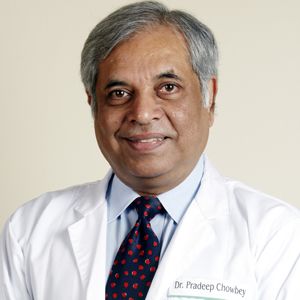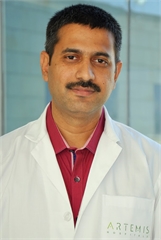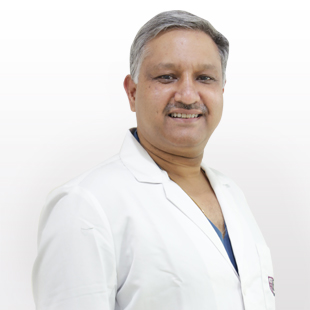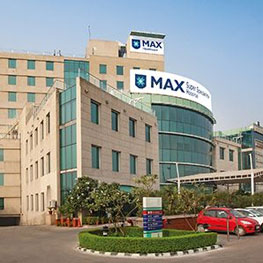About The Doctor
Dr. Pradeep Chowbey is a world-renowned pioneering laparoscopic surgeon. With over 45 years of surgical experience, he has trained more than 20,000 surgeons from around the world in minimally invasive surgeries. He is one of the first to perform laparoscopic cholecystectomy in North India and the first to perform MAFT (Minimally Invasive Fistula Technology) in the Asia Pacific Region. He has graphed his career with singular determination to develop, evaluate, and propagate Minimal Access, Metabolic & Bariatric Surgery in India, and the Asian subcontinent. His Institute at Max Healthcare was the first to receive the Center of excellence accreditations in India for Metabolic & Bariatric Surgery, Hernia Surgery by Surgical Review Corporation, USA (2011-2014).
Specialization
- MAMBS & Allied Surgical Specialities
Awards
- Lifetime Achievement Award by IAGES in February,2015
- Lifetime Achievement Award by Human Care Charitable Trust in August 2014
- IMAAN INDIA SAMMAN award, October 2014
- A Legend during the Lifetime Award by Balkan Ji Bari International, September 2013
- Chairman’s Award by Max Healthcare, January 2012
- Honorary Rotarian by Rotary Club of Delhi, May 2011
- Doctor of Science (Honoris Causa Doctorate) by His Excellency Governor of MP and the Vice-Chancellor of the University of Jabalpur, October 2007
- Dr. K.C Mahajan Award for Best Academician, January 2006
- Gem of India Award for excellence in field, 2006
- Arch of Excellence (Medicare) Award, 2006
- Bharat Jyoti Award, 2006
- Rashtriya Rattan Award & Gold Medal for Medical Excellence, December, 2005
- Indira Gandhi Priyadarshini Award for Excellence in the laparoscopy field, November 2005
- Dhanvantari Award for Excellence in Health Care, November, 2005
- Awarded IMAGES Masters Virk Award – 2005 by Virk Hospital Centre for Human Reproduction
- Awarded Padma Shri, the highest civilian honor, awarded by the Hon. President of India in January 2002
- ACADIMA 2001, awarded in the field of Minimal Access Surgery
- Aadharshila award for excellent work and contribution in the field of medicine
- Placed in Limca Book of Records 2000 to 2009 consecutive years for most minimal access surgery
- Ratna Award in Laparoscopic Surgery by Punjab Government in February 2000
- Awarded by Guinness Book of Records for most minimal access surgery in 1997
- Awarded Arya award for the most compassionate doctor in 1997
- Vocational award 1995-96 by Rotary International
Frequently Asked Questions About Bariatric and Laparoscopic Surgery
Is weight loss surgery for you?
According to international accepted criteria, the indications for obesity surgery are BMI > 40 kg/m2 or BMI>35 with pronounced co-morbidities. It is also requires several failed non-surgical attempts at weight reduction under the guidance of a physician over a period of one year and the absence of surgical contraindication or concomitant disease. Nevertheless, limits to the indication for surgery continue to be changing. For example, diabetes specialists suggest that a BMI of 32 kg/m2 in patients with type 2 diabetes as an indication for surgery.
Recent advanced in Bariatric & Metabolic surgery
Surgical weight loss is exclusively performed by laparoscopy or key hole surgery in which operations are performed through 4 – 5 small (usually 0.5 – 1.2 cm) incisions. Specialized equipment and instrumentations are necessary for this technique makes it a little more expensive than laparoscopy for other diseases. Latest additions in the field of laparoscopy include Single Incision Laparoscopic surgery, Robotic surgery & Endoluminal surgeries all of which are aimed at increasing the safety of the procedures as well as making it less invasive than conventional laparoscopic procedures.
What Are The Benefits Of Laparoscopic Surgery?
The benefits of laparoscopic procedure over open surgery are impressive. By decreasing injury to skin and muscles, the resultant pain and discomfort are reduced. Oral intake can be started by the same evening. Most of the patients can be discharged from the hospital the next day as compared to three to five days after open surgery. After laparoscopic cholecystectomy, recovery time (at home) is usually around five days as compared to three-six weeks for open surgery. Tiny punctures of laparoscopic surgery are cosmetically superior to long scar of conventional surgery
How Is Diseased Gallbladder Removed?
The traditional way to remove the diseased gallbladder was through a 15 to 20 cm incision in the abdomen, cutting skin; fat, and three layers of muscles underneath, which were then stitched back in layers (open surgery). Now, the same surgery can be performed through tiny skin punctures, without damaging underlying muscles. The technique is called Laparoscopic cholecystectomy.
Diabesity: Is surgery a cure?
Diabetes being a medical disease, it was traditionally treated by diet and exercise with mild oral medicines. The disease keeps on progressing in most people with on-going complications on many organs in the body. It is associated with high cholesterol levels, high blood pressure, fatty liver disease, obesity and polycystic ovary disease causing the Metabolic Syndrome and also kidney failures, heart attacks, eye problems including blindness, nerve diseases etc. Diabetic surgery is surgery for cure of diabetes associated with or without obesity. These type of surgeries are performed for people with uncontrolled levels of blood parameters even after the maximum dose of drugs has been given and when the disease has become life threatening.
What are the benefits of taking treatment through MMT instead of directly from the doctor?
We provide services from top doctors across top hospitals to ensure that you get the best treatment.













